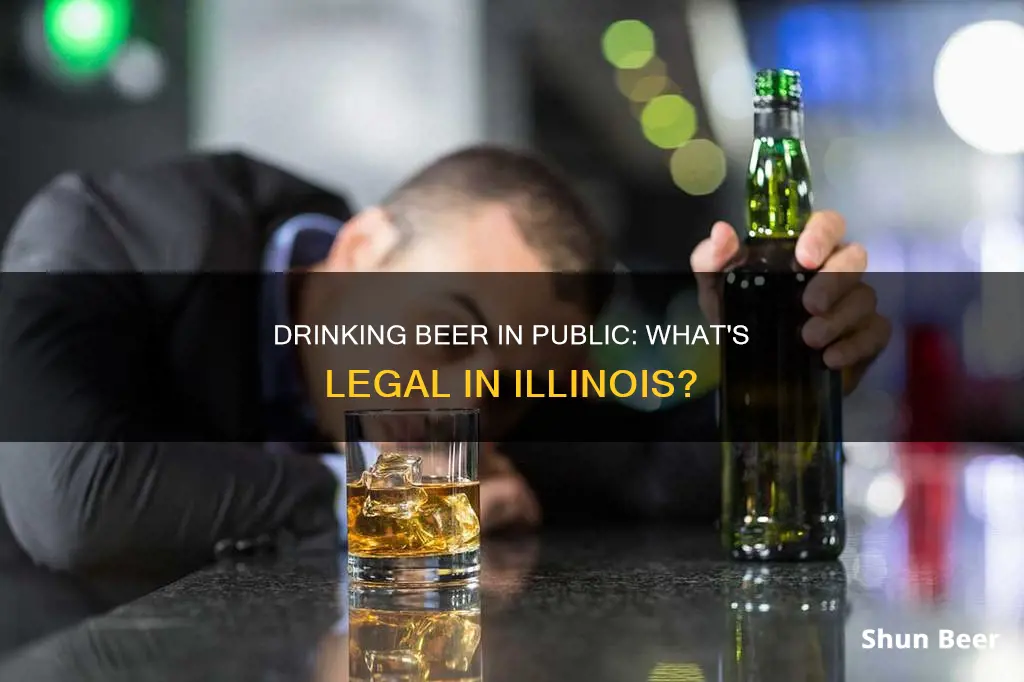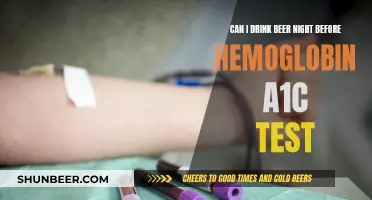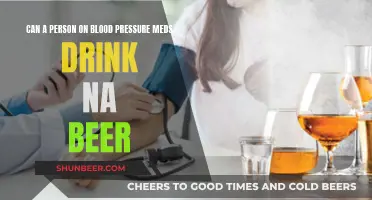
In Illinois, it is illegal to drink beer or any other alcoholic beverage in public places, including streets and vehicles on public roads. However, there are some exceptions to this rule, such as drinking in licensed establishments, certain areas of Navy Pier, and venues with a valid Riverwalk Venue liquor license. While public intoxication is not a crime in Illinois for those over 21, consuming alcohol in public can be illegal, and there are restrictions on drinking in state parks and recreation areas. Additionally, open container laws in Illinois prohibit drivers and passengers from possessing or transporting open containers of alcohol within the passenger area of a vehicle.
| Characteristics | Values |
|---|---|
| Drinking in public | Illegal |
| Drinking in public on a parade route | Illegal and punishable by a fine of $500-$1,000 and/or imprisonment of up to six months |
| Drinking in public on a public way or in a motor vehicle | Illegal, with some exceptions for certain licensed establishments and vehicles |
| Drinking in public in state parks and recreation areas | Illegal and punishable by a fine of $75 or up to $1,500 and/or imprisonment of 1-6 months |
| Drinking in public if under 21 | Illegal |
| Public intoxication | Not illegal, but doing certain things while drunk (e.g. driving) is illegal |
| Transporting open containers of alcohol in a vehicle | Illegal for drivers and passengers, except in limousines, chartered buses, and motorhomes or mini motorhomes |
| Minimum age for servers and bartenders of beer, wine, and spirits | 18 |
What You'll Learn

Drinking in public ways—exceptions
Drinking in public ways in Illinois is generally prohibited. However, there are some exceptions to this rule, which are detailed below:
Firstly, drinking on a public way is allowed in any portion of the public way occupied by a sidewalk cafe that is properly licensed to sell alcoholic liquor. This exception is outlined in Chapter 10-28 of the Municipal Code of Chicago.
Secondly, drinking is permitted on any part of Navy Pier, provided that the alcoholic beverage was purchased at a licensed establishment on the pier, is consumed in an approved container with the establishment's name, and is not brought into or consumed in a designated prohibited area.
Thirdly, venues with a valid Riverwalk Venue liquor license under Section 4-60-074 are exempt from the public drinking prohibition.
In addition to these exceptions, it is important to note that the state of Illinois does not criminalize public intoxication. However, consuming alcohol in public and possessing open containers can be illegal, and local laws may impose additional restrictions. For example, specific codes in Urbana and Champaign prohibit the possession or consumption of alcoholic beverages in public without a special permit.
Furthermore, while public intoxication is not a crime in Illinois, it may attract police attention and lead to background checks. Additionally, it is important to remember that drinking and driving, as well as possessing open containers of alcohol in a vehicle, are prohibited and can result in serious consequences.
Drinking Beer on Chicago Streets: What's the Law?
You may want to see also

Drinking in public is not a crime
In Illinois, drinking in public is not a crime, but there are several exceptions and nuances to this rule. Firstly, it is important to distinguish between public intoxication and drinking in public. While public intoxication may be illegal in some states, it is not a crime in Illinois. However, consuming alcohol in public can be illegal in certain circumstances.
According to Illinois law, it is unlawful for any person to drink alcoholic beverages on any public way or in a motor vehicle on a public way. This includes drinking while driving or being a passenger in a vehicle with open containers of alcohol. There are, however, some exceptions to this rule. For example, drinking on a portion of the public way occupied by a licensed sidewalk cafe or on Navy Pier is allowed under certain conditions. Additionally, passengers in limousines, chartered buses, and motorhomes or mini motorhomes are exempt from the open container law as long as the alcohol is separated from the driver by a partition.
It is also important to note that local laws may impose additional restrictions. For instance, in Urbana and Champaign, it is illegal to possess or consume alcohol in public without a special permit. Furthermore, Illinois state parks and recreation areas may prohibit alcohol consumption in specific areas, and violations can result in fines or even jail time.
While drinking in public may not be a crime in Illinois, it is crucial to be mindful of the specific laws and regulations that apply to different locations and situations. Additionally, drinking in public can attract police attention, which may lead to background checks and potential legal consequences if any outstanding warrants are discovered. Therefore, it is essential to stay informed and comply with the relevant laws and restrictions to avoid any legal issues.
In conclusion, while drinking in public may not be a crime in Illinois, there are various regulations and exceptions that individuals should be aware of to ensure they are acting within the boundaries of the law. These regulations are in place to promote public safety and maintain a wholesome atmosphere for all individuals to enjoy.
Beer and Cephalexin: A Safe Mix?
You may want to see also

Transporting open alcohol in a vehicle
In Illinois, it is illegal to transport open alcohol in a motor vehicle. Under 625 ILCS 5/11-502 of the Illinois Vehicle Code, it is unlawful for any driver to transport, carry, possess or have any open alcohol container in the passenger area of any motor vehicle upon a highway in Illinois. Open alcohol includes open beer, wine, liquor, and champagne, but is not limited to these beverages.
Passengers of vehicles may also be charged with a violation of this law. The only exception is the possession of open alcohol in the passenger areas of limousines, chartered buses, and motorhomes or mini motorhomes, where the container of alcohol must be separated from the driver of the vehicle by a partition. Alcoholic beverages must remain in their original container with the seal unbroken if transported in the passenger area of the vehicle. If you choose to transport an open container of alcohol, it must be secured in the trunk of your vehicle to avoid breaking the law in Illinois.
The law does not consider whether you were recently consuming alcohol or were unaware of the alcohol in your vehicle. You can still be charged if the alcohol was left in your vehicle days, weeks, or months ago.
Being in possession of open alcohol in a vehicle can have serious consequences for your driver's license, especially if you are under the age of 21. Under Illinois law, if you are under 21 at the time of the violation, the Illinois Secretary of State will impose a 12-month driver's license suspension for a first conviction of this offense. If you are 21 or older, a second conviction within a year will result in the same penalty. A third or subsequent conviction within a 12-month period will result in your driver's license being revoked. There are additional penalties if you have a prior suspension or revocation within the past seven years.
Along with these possible license consequences, a violation of the Illinois open container law will subject a driver to high potential court costs, fines, and auto insurance rate increases. It is punishable by a fine of up to $1,000. Other conditions, such as community service, may also be imposed by the judge. The offense itself carries 25 points on your driving record.
Beer Drinking in Alaska: What's the Deal?
You may want to see also

Underage drinking laws
In Illinois, it is generally illegal for a person under the age of 21 to consume alcohol. If a person under 21 is found guilty of consuming alcohol, they will lose their driving privileges for 3 to 6 months, even if they were not driving.
There are some exceptions to the law. For example, it is not illegal for a minor to consume alcohol under the direct supervision of a parent or guardian in a private home. The law states that "the consumption of [alcohol] by a person under 21 years of age under the direct supervision and approval of the parents or parent or those standing in loco parentis of such person under 21 years of age in the privacy of a home, is not prohibited by this Act."
Two court cases help to explain the parental-supervision exemption. In People v. Finkenbinder, the minor consumed alcohol at a family gathering with their mother's approval. However, since the mother did not know how much the minor drank, what type of liquor was consumed, or even that the minor had left the house, the court held that the minor was never under "direct supervision" and was therefore guilty. In contrast, in People v. Haase, the minor consumed one wine cooler while under direct supervision and then left the house to assist a friend with a broken-down car. The appeals court found that, even though there was still some alcohol in the minor's system, the parental-supervision exemption still applied.
It is also illegal for a parent or legal guardian to allow persons under 21 to consume alcoholic beverages on their property or in any vehicle or watercraft under their control. If a death or personal injury occurs as a result of consumption, the parent or guardian may face criminal penalties.
In addition to the above, it is worth noting that public intoxication is not a crime in Illinois. However, consuming alcohol in public is illegal and can result in a fine of $100 to $500 or imprisonment for up to six months.
Beer for Slugs: Does It Work?
You may want to see also

Drinking in Illinois state parks
Drinking in public is generally prohibited in Illinois. However, there are exceptions to this rule, and it is not illegal to be drunk in public if you are over the age of 21.
In Illinois state parks and recreation areas, the consumption and possession of alcohol are subject to certain restrictions. While alcohol is banned in some areas, it is permitted in others. The Illinois Department of Natural Resources (IDNR) has a list of sites with alcohol restrictions on its website, and these restrictions vary depending on the specific site. For example, at Illinois Beach State Park, alcohol is prohibited on the beach, picnic area, and campground, but it is permitted at the resort.
According to the IDNR, out of the 130 state parks in Illinois, alcohol is allowed in 77 of them and is only banned in the parks that are listed on their website. These restrictions are in place to ensure that visitors have a safe and enjoyable experience at these sites, especially considering that many families frequent these areas for picnics and other outdoor activities.
While the consumption of alcohol in Illinois state parks is not universally banned, it is important to be mindful of the specific rules and regulations of each park. Violating these restrictions can result in a fine of $75 payable through the mail, or a more severe punishment if the case goes to court, including jail time and a higher fine.
Vaccinated and Thirsty: Beer and COVID Vaccine Timing
You may want to see also
Frequently asked questions
Drinking beer in public is generally prohibited in Illinois. However, there are certain exceptions, such as when in a licensed establishment or a designated area.
No, it is unlawful to possess or consume intoxicating beverages, including beer, in any Department-controlled parks and recreation areas that prohibit alcohol.
No, it is unlawful to drink any alcoholic beverage on any public way or in any motor vehicle upon a public way in Illinois.
Drinking in public is prohibited within 800 feet of a parade route that is closed to traffic.
Drinking on a sidewalk is prohibited unless it is a part of a licensed establishment that is permitted to serve alcohol.







